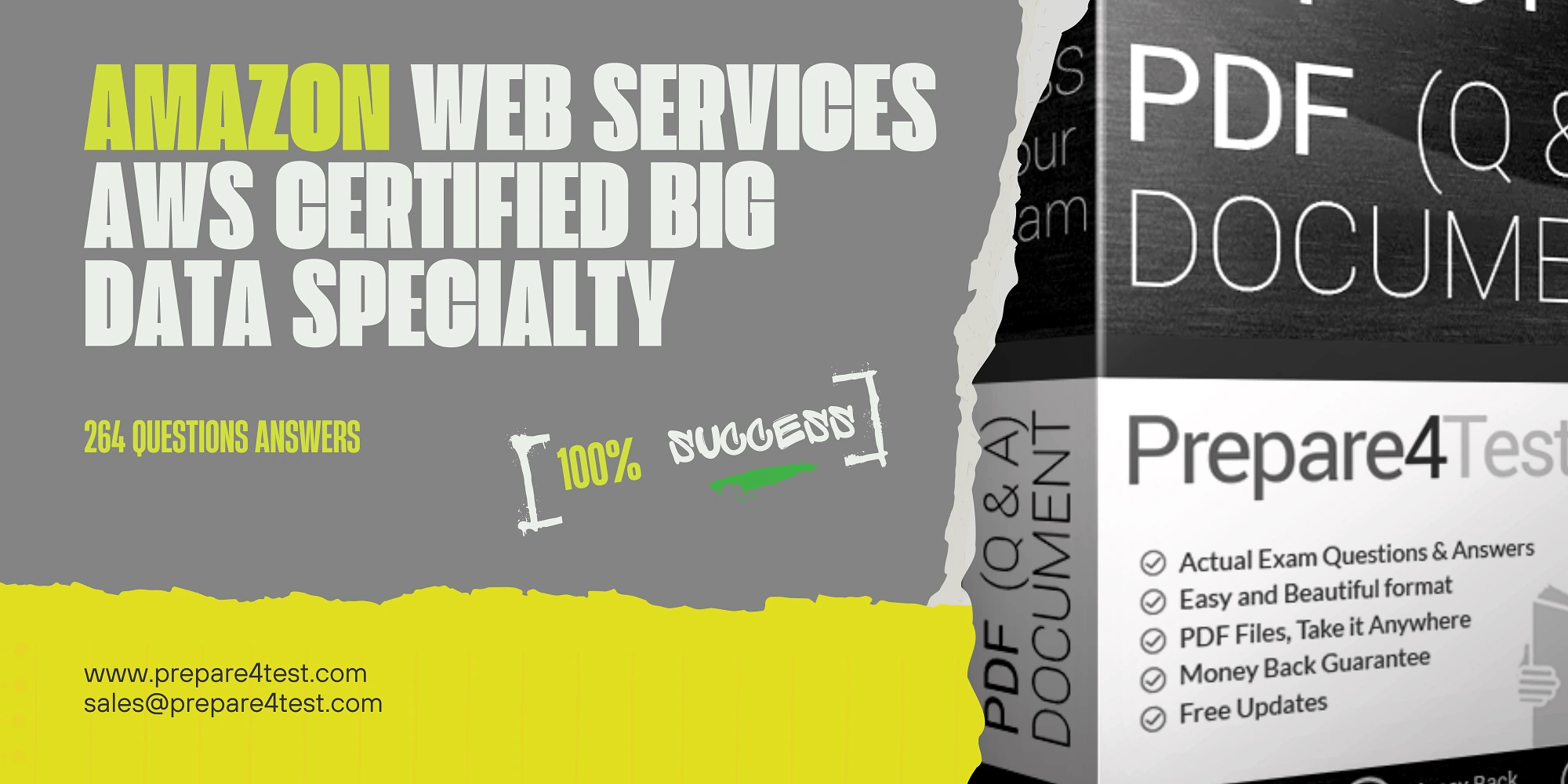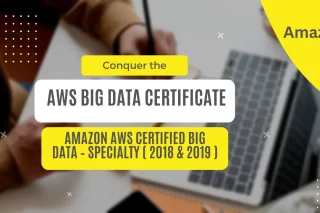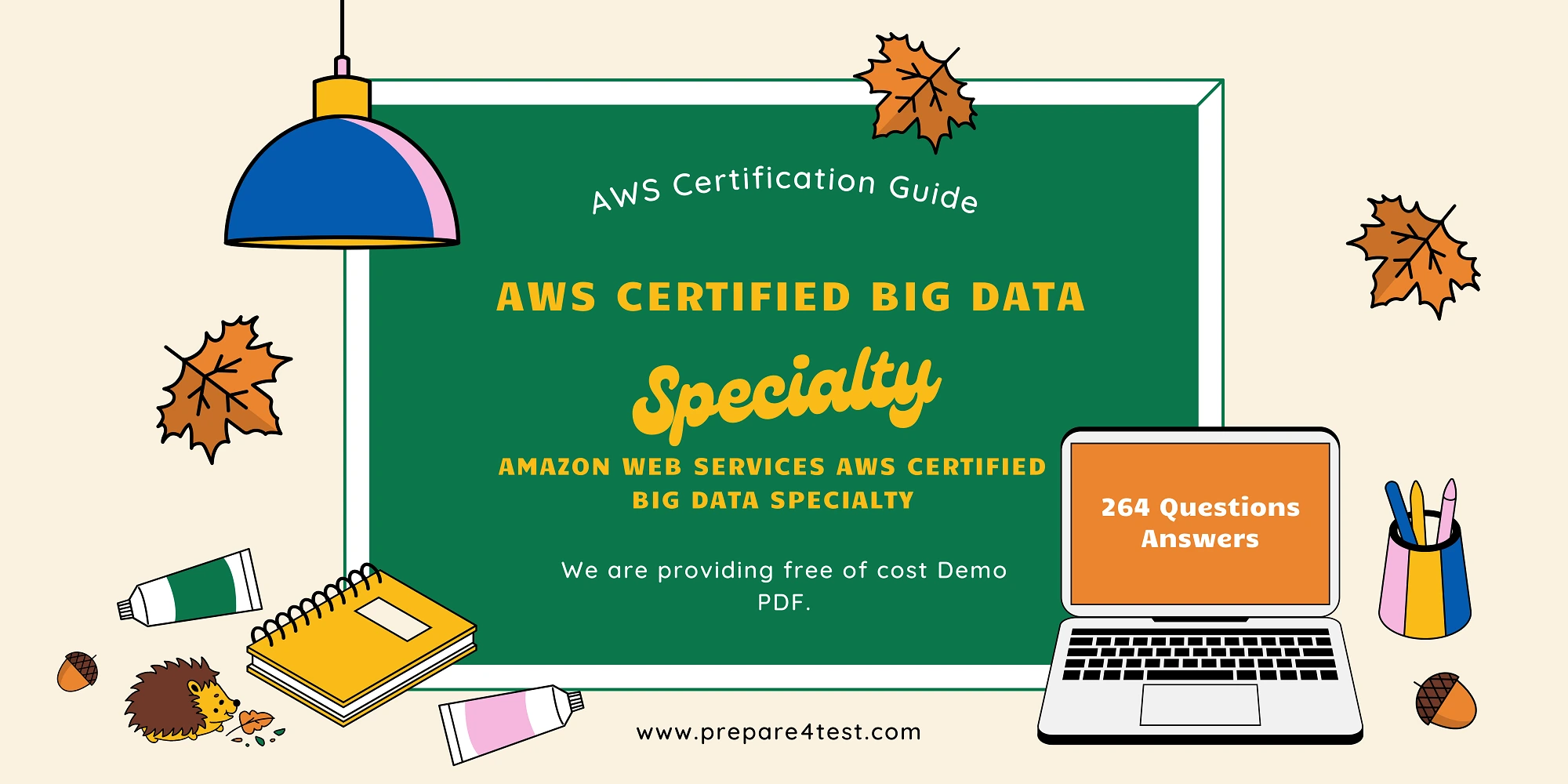
Introduction to AWS Certified Big Data Specialty
Achieving the AWS Certified Big Data – Specialty badge verifies your ability to design and implement AWS services to efficiently collect, store, process, and analyze large amounts of data. It is a niche certification aimed at experienced big data professionals looking to advance their careers by demonstrating their expertise with AWS big data services.
This all-inclusive manual, we will cover everything you need to know to prepare for the AWS Certified Big Data – Specialty exam, including an overview of the certification, exam details, recommended knowledge and experience, exam domains, preparation tips, and sample questions. Whether you are just starting your preparation or looking to fill in gaps, this guide will provide extensive information and resources to help you succeed.
Overview of AWS Big Data Specialty Certification
The AWS Certified Big Data – Specialty cert is intended for individuals who analyze large amounts of data in sophisticated ways and implement AWS services to automate data collection, storage, and processing.
It validates a candidate’s ability to:
- Define and architect AWS big data services
- Explain how AWS big data services fit into the data lifecycle
- Design and optimize cost-effective and highly scalable big data solutions on AWS
- Automate data collection, storage, and processing with AWS services
Those who acquire this credential have proven their mastery of the technical aspects of developing, deploying, and sustaining big data solutions on AWS.
Benefits of AWS Certified Big Data Specialty
Pursuing the AWS Certified Big Data – Specialty certification provides several key benefits:
- Industry recognition – The certification validates your expertise to employers and demonstrates your cloud skills.
- Higher salaries – Certified professionals command higher salaries on average.
- Career advancement – The certification can boost your career as a big data engineer, architect, analyst, or scientist.
- Learn AWS services – You gain knowledge of AWS big data services through certification preparation.
- Distinguish your skills – Certification holders stand out from other candidates for big data roles.
Recommended Knowledge and Experience
AWS recommends having the following experience before attempting the Big Data Specialty exam:
- At least two years of experience using AWS
- 5+ years in a data analytics role
- Ability to define and architect AWS big data services
- Understanding of how AWS services fit in the data lifecycle
- Familiarity with large-scale distributed systems like Hadoop and Spark
While there are no mandatory prerequisites, having an Associate-level or Cloud Practitioner certification demonstrates foundational AWS knowledge. Hands-on experience with AWS services like S3, Redshift, and EMR is also recommended.
Target Audience
The article is tailored for experienced big data professionals looking to validate their AWS big data skills by getting certified. At least 2 years of hands-on big data experience is recommended.
Exam Details and Format
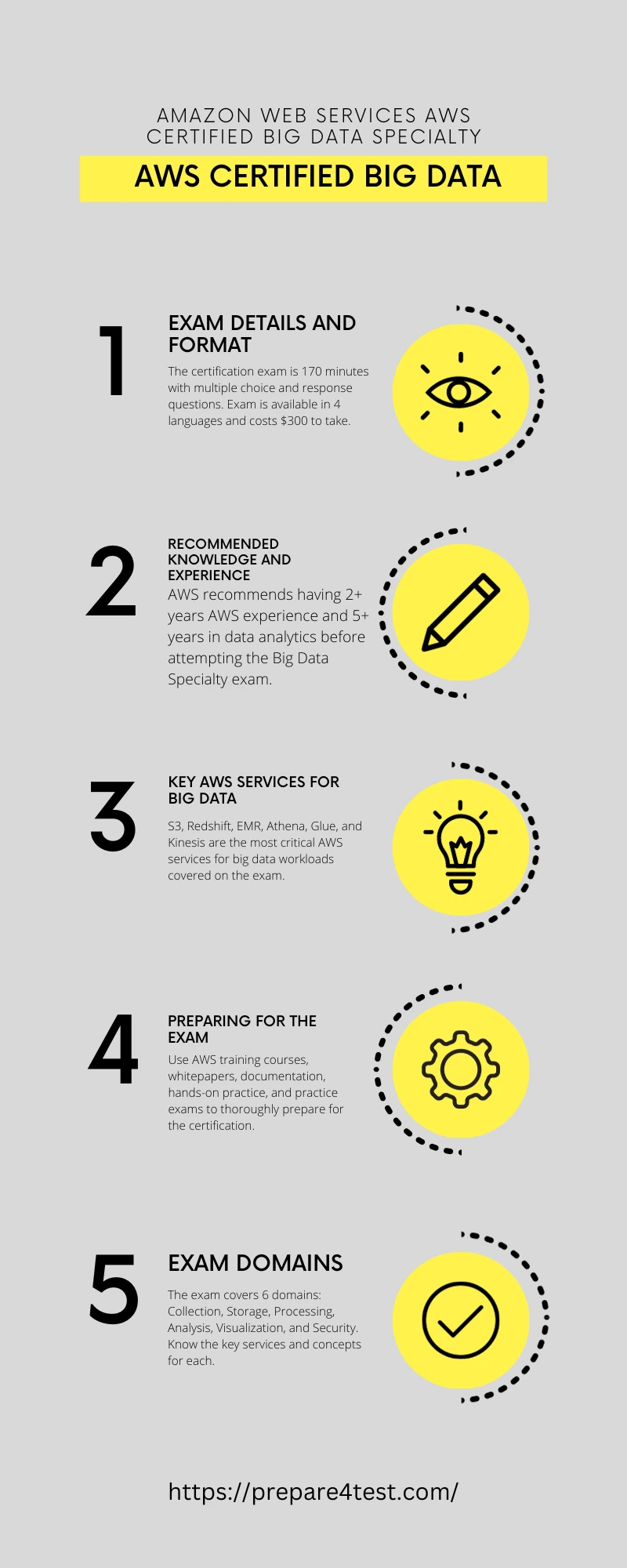
Let’s take a look at key details about accreditation in AWS’s Big Data Specialty.
Exam Length and Registration
- 170 minutes to complete the exam
- Multiple-choice and multiple-response questions
- Taken at an AWS testing center
- Languages supported include English, Japanese, Korean, and Simplified Chinese
- Registration fee of $300 USD
Scoring and Passing The Exam
- Scored from 100-1000 points
- Minimum passing score of 750 points
- Results delivered immediately after completion
- Certification valid for three years
Exam Domains
The exam covers six domains focusing on key big data concepts and AWS services:
- Domain 1: Collection – 10% of exam
- S3, Kinesis, AWS Data Exchange, IoT Core
- Domain 2: Storage and Data Management – 20% of exam
- S3, EBS, Glacier, EFS, Storage Gateway, Data Pipeline, DataSync
- Domain 3: Processing – 20% of exam
- EMR, Athena, Glue, Elasticsearch, MSK
- Domain 4: Analysis – 15% of exam
- Redshift, Quicksight, Data Pipeline, Glue
- Domain 5: Visualization – 15% of exam
- Quicksight, S3, Redshift
- Domain 6: Security – 10% of exam
- KMS, VPC, IAM, Cognito, GuardDuty, Macie, Certificate Manager
Refer to the official exam guide for the most up-to-date weighting of domains.
Preparing for the Exam
The only way to ensure success on the AWS Certified Big Data – Specialty test is to study thoroughly.
Here are some tips for preparing for the AWS Certified Big Data – Specialty exam:
- Take AWS training courses on big data topics like the Data Analytics Fundamentals and Big Data on AWS courses. These will help you gain the required knowledge.
- Read AWS whitepapers and documentation on big data services like Amazon EMR, Amazon Redshift, Amazon Kinesis etc. Hands-on experience will be key.
- Solve sample questions and practice exams from reputable sites. This will help assess your exam readiness.
- Review the exam guide and content outline in detail. Ensure you are comfortable with all the topic areas.
- Get hands-on experience with core AWS big data services by working on projects, labs, and demos.
- Read blogs and discussion forums to learn from others who have cleared the exam.
A combination of theory and hands-on practice is important for clearing this exam. Give yourself adequate preparation time and take the exam only when fully ready.
Study Plan Tips
- Read exam guide – Understand exam domains, content areas, and knowledge requirements
- Take practice exams – Identify weak areas to focus your study on
- Use multiple learning methods – Combine lectures, hands-on practice, whitepapers, documentation
- Focus on key services – Such as S3, Redshift, EMR, Athena, Glue, Kinesis
- Learn security concepts – Encryption, access controls, auditing, and data protection
- Read questions carefully – AWS exams have multiple correct responses
- Get hands-on experience – Using AWS services for big data workloads
Recommended Study Resources
- AWS Training Courses
- Big Data on AWS
- Exam Readiness: AWS Certified Big Data – Specialty
- AWS Whitepapers
- AWS Well-Architected Framework – Analytics Lens
- Amazon S3 Storage Classes
- Implementing Microservices on AWS
- AWS Documentation
- Amazon Athena
- Amazon EMR
- Amazon Redshift
- AWS Big Data Blog
- Practice Tests
- Whizlabs
- Jon Bonso practice tests
- Online Courses
- A Cloud Guru
- Linux Academy
- Udemy
A combination of training courses, hands-on experience, whitepapers, and practice tests will thoroughly prepare you for the exam.
Sample Exam Questions
These sample questions reflect the structure and style of the questions on the real exam and are provided for your reference.
Question 1:
A media company collects large amounts of social media data in real time using Kinesis Data Streams. The company needs to run ETL jobs every hour to extract insights from the data. Which approach will meet these requirements?
- A. Store data in S3 and use AWS Glue crawlers to populate the Glue Data Catalog. Trigger ETL jobs using recurring triggers in AWS Glue.
- B. Store data in DynamoDB and use AWS Lambda functions to populate the Glue Data Catalog. Trigger ETL jobs using recurring triggers in AWS Glue.
- C. Store data in S3 and use AWS Lambda functions to populate the Glue Data Catalog. Trigger ETL jobs using recurring triggers in AWS Glue.
- D. Store data in S3 and use AWS Glue crawlers to populate the Glue Data Catalog. Trigger ETL jobs using cron jobs on EMR clusters.
Question 2:
A financial services company needs to analyze large datasets as part of its fraud detection application. The company wants to reduce processing time and lower costs. Which approach will meet these requirements?
- A. Use Amazon Redshift for processing and analysis. Load data incrementally from S3 using Redshift Spectrum.
- B. Use Amazon EMR with Spark for processing and analysis. Store data in HDFS.
- C. Use Amazon Athena for processing and analysis. Store data in S3.
- D. Use Amazon EMR with Hive for processing. Store data in HDFS. Use Amazon QuickSight for analysis and dashboards.
Question 3:
A media company is migrating its on-premises Apache Hadoop cluster to AWS. The cluster has a capacity of 100 TB and runs batch jobs using MapReduce daily. The company wants to minimize operational overhead. Which approach will meet these requirements?
- A. Use Amazon EMR and store data in HDFS. Terminate the cluster after the daily jobs are complete.
- B. Use Amazon EMR and store data in S3. Use auto-scaling to add and remove capacity.
- C. Use Amazon Redshift for processing and analysis. Use Redshift Spectrum to query data in S3.
- D. Use Amazon EMR with HBase instead of HDFS. Keep the cluster running to avoid startup time.
Conclusion
The AWS Certified Big Data – Specialty certification confirms your ability to implement scalable big data solutions on AWS. This guide provided an extensive overview of the certification exam, including its scope, format, domains, preparation tips, and sample questions.
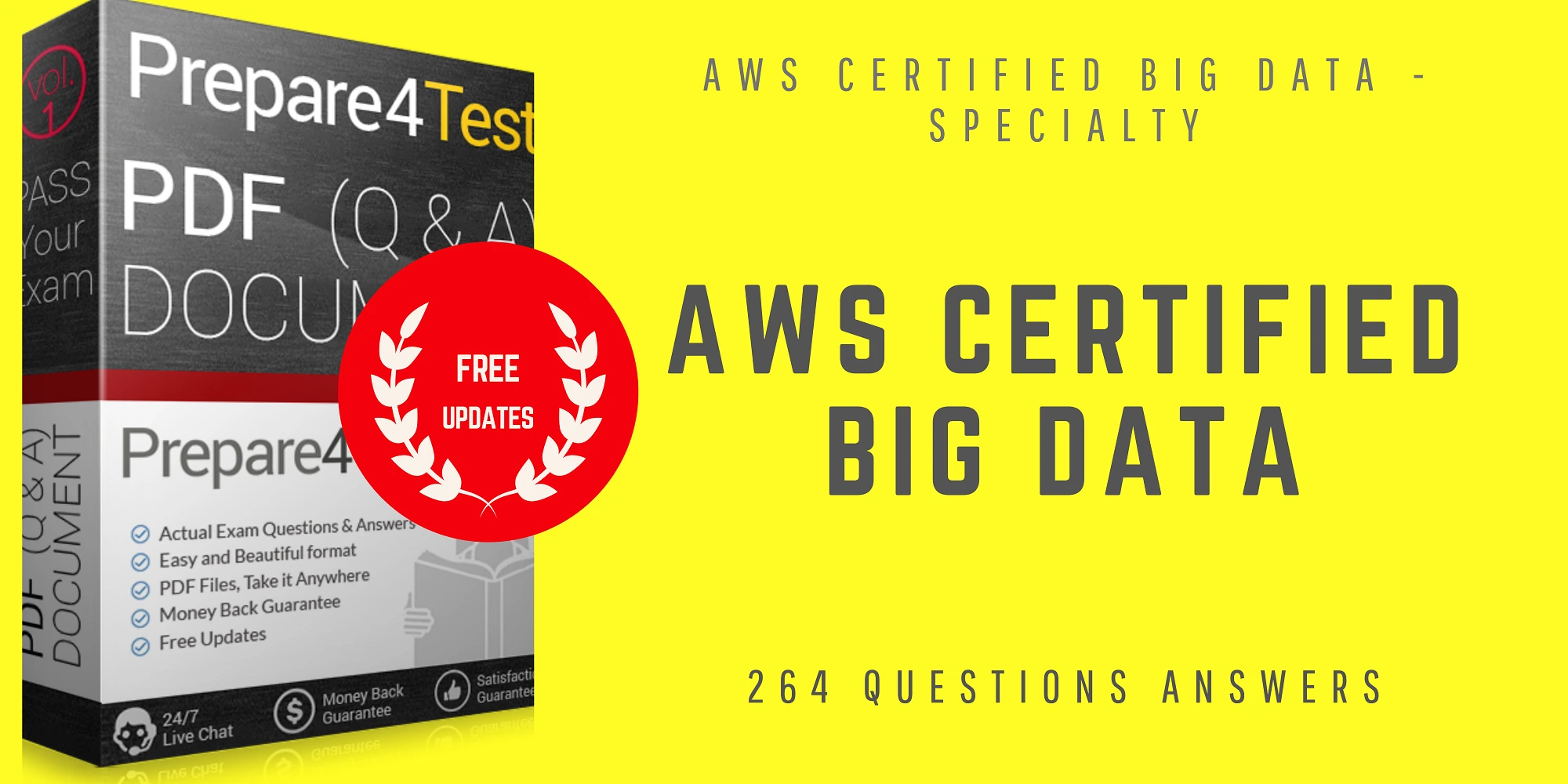
With the right combination of study materials, hands-on experience, and practice tests, you will be well prepared to demonstrate your proficiency in designing and deploying big data analytics architectures on AWS. Earning the credential can provide doors for professional growth as a big data professional and establish your expertise in this high-demand field.
